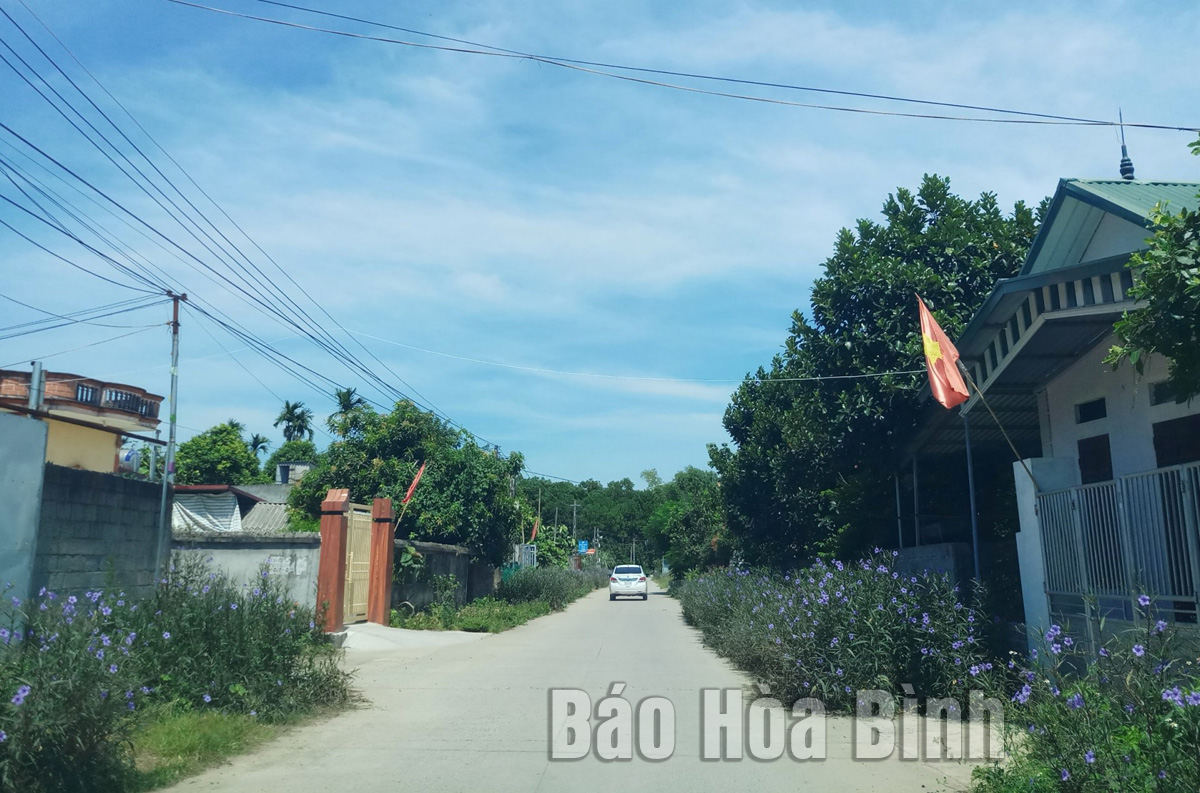
(HBO) – Thanks to the joint efforts of the whole political system and the support of local residents, Hoa Binh has been among leading localities in the northern mountainous region in implementing the National Target Programme on New-Style Rural Area Building with many important achievements.
Rural roads in
Nhuan Trach commune, Luong Son district, has been expanded and become cleaner
and more beautiful, contributing to making the locality a model new-style rural
area.
In the 2021-2025 period, the province aims to continue to carry out the
programme effectively in association with the restructuring of the agricultural
sector, enhancing the living conditions for locals, promoting socio-economic
infrastructure system, and maintaining the traditional cultural identity, thus
making the rural area a worth-living place.
Specifically, by 2025, the province expects 76.7% of its communes to be
recognised as new-style rural areas, 37.4% certified as advanced new-style
rural areas, and 8.1% becoming model new-style rural areas.
At the same time, 50% of the total districts are to complete all criteria of
the programme, and at least one district is expected to become an advanced
new-style rural area. On average, each commune is hoped to finish 17 out of the
19 criteria of the programme.
Vice Chairman of the provincial People’s Committee Dinh Cong Su said that in
order to complete the goals, in the 2021-2025 period, Hoa Binh will invest 27
trillion VND (1.1 billion USD) in the programme.
At the same time, the locality will continue to encourage local residents to
involve themselves in the programme, while prioritising resources for the
completion of the fundamental infrastructure system in communes, especially
those with extreme difficulties, speeding up the agricultural sector, paying
more attention to human resources training, and promoting the development of
handicraft and tourism, he said.
The official said that the provincial People’s Committee is directing the local
administrations and sectors to mobilise resources for the building of new-style
rural areas. Along with the central budget, localities have been asked to
consider the spending of parts of local budget for the programme, while paying
special attention to extremely difficult communes and those that have
registered to become new-style rural areas in the 2021-205 period.
At the same time, the implementation of the criteria that have been lagging
behind will be sped up, with focus on supporting the development of corporate
economy and cooperatives as well as the production in value chain so as to
create more jobs and increase incomes for rural dwellers, he added./.
Hoa Binh province is undergoing a dynamic transformation amid Vietnam’s national digital transition. Building on Poliburo’s Resolution No. 57-NQ/TW on breakthroughs in science, technology, innovation, and national digital transformation, the province has rolled out a wide range of practical action plans. A standout initiative is the "Digital Literacy for All” movement, an effort to ensure that no one is left behind in the digital era.
Hoa Binh province is undergoing a dynamic transformation in the wake of the national digital transformation movement. Building on Resolution No. 57-NQ/TW of the Politburo on breakthroughs in science, technology, innovation, and national digital transformation, the province has implemented a wide range of practical action plans. A standout initiative is the "Digital Literacy for All” movement ambitious effort to ensure that no one is left behind in the digital age.
With a spirit of unity and proactive problem-solving, the Party Committee, the government and the people of Dong Lai Commune (Tan Lac District) have made great strides in implementing the resolutions of the 24th Party Congress of the commune for the 2020 - 2025 term. Focusing on leadership and practical actions, the commune has brought the Party’s resolutions into daily life, creating strong impacts and pushing the local development forward.
Amid the nationwide push for digital transformation, young people in Hoa Binh Province are stepping up as dynamic pioneers, applying technology to enhance Youth Union operations and expand the reach of youth-led initiatives. Through creativity and adaptability, Youth Union organizations at all levels have introduced a series of practical solutions, contributing to modern governance and community development.
In recent years, An Nghia commune, located in Lac Son district, has stepped up administrative reform, focusing on improving the quality and efficiency of its single-window service unit for receiving and processing administrative procedures. These improvements have helped create favourable conditions for local residents and organisations to handle administrative procedures, contributing to the commune’s broader socio-economic development.
The Prime Minister-approved master plan to develop the multi-use value of forests ecosystems through 2030, with a vision to 2050, aims to improve the management and sustainable use of forest resources, create jobs, increase incomes, and improve the living standards of ethnic minorities, people in mountainous and remote areas, forest workers and those living near forests.



